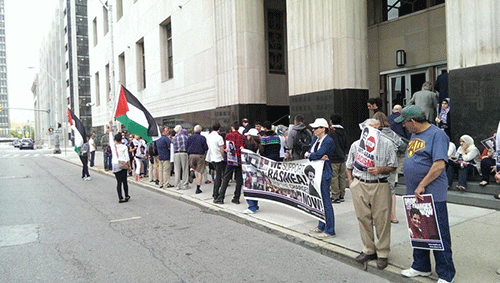
|
| Protesters gather in front of the federal court house in Detroit in support of Rasmea Odeh on Thursday July, 31th. |
DETROIT — The judge overseeing the trial of Palestinian American activist Rasmea Odeh refused to recuse himself from the case during a hearing on Thursday, July 31.
Odeh was indicted for allegedly lying on her U.S. citizenship application about a conviction in an Israeli military court decades ago. Her defense lawyers had asked U.S. District Judge Paul Borman to step down from the case because of his support of Israel.
According to Odeh’s defense, Borman cannot play the “neutral and detached” role that the law requires because he and his family have donated millions of dollars to Israel and coordinated pro-Israeli political efforts.
“Clearly, one who has been a life-long supporter and promoter of Israel and has deep ties to the State of Israel spanning over 50 years, who no doubts believes that Israel is a great democracy and protector of human rights, cannot be ‘reasonably’ said to be impartial when these claims of torture and illegality are raised by a Palestinian defendant,” argued Odeh’s attorneys, Michael Deutsch and James Fennerty, in their brief.
However, the judge stated in his argument that his Jewish faith should not bar him from overseeing the case.
Deutsch said Borman should not have perceived the motion subjectively.
“It is not about if he feels he can be fair and impartial. It is about if an objective observer can see him as fair and impartial,” he said.
Odeh had rejected a plea bargain that would have seen her serve a six-month prison sentence and get deported six months after her release from jail. The prosecution is demanding she serve a 10-year sentence.
Odeh’s supporter have criticized the trial as a “political witch-hunt.” More than 100 people demonstrated outside the courthouse with Palestinian flags and signs with Odeh’s picture that read, “I support Rasmea.”
Her supporters also packed the courtroom to its maximum capacity.
Odeh, 66, was arrested by federal agents at her Chicago home on Oct. 22, 2013. She is currently free on bail.
She was found guilty of “membership in an illegal organization” in Israel in 1970. She was convicted for being a member of the Popular Front of Liberation of Palestine (PFLP) and participating in three bombings claimed by the organization, one of which targeted a marketplace.
She served 10 years in Israeli prisons before being released in a prisoner-exchange deal between Israel and the PFLP.
Another motion that was discussed at the hearing was the defense lawyer’s intent to have an expert testify on Odeh’s psychological state. According to Deutsch, Odeh suffers from Post Traumatic Stress Disorder and was physically and sexually tortured in the Israeli prison. The attorney explained that the psychology expert would be able to provide a framework for the jury to understand how Odeh interpreted the questions on her citizenship application.
The prosecution argued that the crime Odeh is charged with is of general intent, not specific intent, and thus the psychological examination would be irrelevant. However, Deutsch described the psychology expert testimony as “critical.” He said Odeh is being accused of knowingly lying on her application to seek U.S. citizenship, which is a specific intention.
Deutsch told the judge that denying the psychological examination would be a violation of Odeh’s 6th Amendment right to a fair trial.
The judge is supposed to rule on the matter at a hearing on Sept. 2.
“Get gone DHS, out of communities out of our mosques” and “DOJ let’s be clear, Rasmea is welcomed here,” chanted the protesters outside the courtroom.
“Our activism is not illegal. We are not afraid, and we will continue on the path of truth,” Kristin Szremski, the media director for American Muslims for Palestine, told the crowd.
Dawud Walid, the executive director of the Michigan chapter of the Council on American Islamic Relations (CAIR-MI), said the prosecution of Odeh is a part of historical efforts by the federal government to go after leaders in communities who demand social justice and urge greater cooperation between ethnic communities.
“Sisters, brothers and any informants who might be in the crowd, Assalam Alaykum,” he greeted the protesters. “We have to put Rasmea’s case in historic perspective in order to build solidarity.”






Leave a Reply